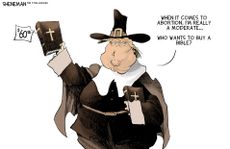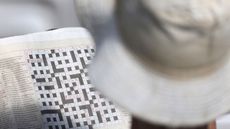How the Nazi invasion of France explains Donald Trump
If you want to understand what's happening to the Republican Party, look at the fall of France in 1940


With Donald Trump's victory in seven states on Super Tuesday, he looks poised to grab the Republican nomination. A lot of people are asking: Why? Some focus on the immediate context: the split Republican field or the primary calendar. Others focus on structural factors: the contempt for the interests of white working-class voters by the GOP establishment and the conservative movement. There are other explanations that focus on the coarsening of our culture — which made reality TV and politics indistinguishable — or the country's legacy of racism. But none of these explain what's really going on.
The best way to understand what Trump has done to the Republican Party might be to read a book from World War II. Every student of politics — every informed citizen — should become familiar with this work. French historian Marc Bloch's The Strange Defeat covers the fall of France in 1940. Bloch saw the month-long Nazi invasion of France and the Low Countries up close: He was a veteran of World War I and a military intelligence officer in the French army reserves who was mobilized during the war. After France's capitulation, Bloch was removed from his teaching job because he was a Jew. He dashed off this book in a fit of anger before joining the Resistance. The Gestapo executed Bloch in 1944, and the book was found and published after his death. It is called "the strange defeat" because, pound for pound and steel for steel, the French and German militaries were evenly matched, yet France's collapse was stunning, immediate, and thorough.
As a military officer, he understood the causes of the French defeat very well. And the Trump campaign brings to mind nothing so much as a blitzkrieg: unexpected and seemingly unstoppable. The people undergoing it might have been capable of fighting back in theory, but they were too stunned by the juggernaut. Trump's opponents first ignored him, thinking he would go away. And then they attacked him for either being politically incorrect, or for not being an orthodox conservative, when that was precisely his appeal. When one has read the memoirs of people who went through the fall of France on the French side, the story appears surprisingly similar to the dithering and indecision of the GOP's megadonors, who have abstained from flooding the airwaves with attack ads, either because they're afraid Trump might sue them, or because they think it's done for. And already, before the battle is lost, some are already willing to sell out their principles and collaborate with the new emperor, just like the French sued for peace even though France's navy and colonial troops were untouched. At some point, France's military did try to reorganize and match Germany's blitzkrieg tactics, a little like how Marco Rubio is now doggedly throwing the kitchen sink at Trump, but it was too late.
Subscribe to The Week
Escape your echo chamber. Get the facts behind the news, plus analysis from multiple perspectives.

Sign up for The Week's Free Newsletters
From our morning news briefing to a weekly Good News Newsletter, get the best of The Week delivered directly to your inbox.
From our morning news briefing to a weekly Good News Newsletter, get the best of The Week delivered directly to your inbox.
For all the fog-of-war causes of this "strange defeat" of the GOP establishment and of the conservative movement, as Bloch's social historian's eye well saw, this sort of demoralization and fecklessness comes about from deep institutional rot. After such a defeat, people keep trying to figure out who to blame. Maybe it's the establishment, too focused on donors. Maybe it's the conservative institutions, too focused on issues that the average voter doesn't care about. Maybe it's the candidates. Bloch's answer is: It's everyone. Bloch is absolutely devastating in charge against every segment of French society.
Bloch indicts the French political and technocratic establishment, all drawn from the same schools and steeped in a "culture of contempt for the common people," an indictment that brings to mind nothing so much as the GOP consultant class. He indicts the political parties, too focused on the everyday blocking and tackling of politics to offer a vision for the common good, and the trade unions, too focused on immediate wage issues. The French bourgeoisie had become a rentier class, going to school for entertainment and then focused on pleasure rather than service to the common good. Government propaganda organs lulled the French people into a sense of false security that made them unprepared for the war effort.
Even though Bloch is not kind to the common people, it is clear that the biggest problem is a widespread failure of French elites to look to the common good and offer a vision for the future. Similarly, since the Bush presidency collapsed under the failures of Iraq, Katrina, and the financial crisis, almost everybody who counts for something in the Republican Party has been implicated in a failure of imagination and a failure to seek or promote a vision and a governing agenda.
The GOP establishment has been preoccupied by appeasing donors while throwing as few bones as possible to the base. The big money guys have been focused only on winning elections. The Tea Party tried to destroy the establishment, but did not suggest how to replace it with anything better. The GOP has been unimaginative and cowardly and too preoccupied by narrow self-interest. The institution is a stately mansion where decades of water damage have weakened the foundation. It only takes a small storm to bring the whole thing down.
This is the lesson of Marc Bloch for today's Republican Party. Who is to blame? Everyone. Whatever happens next, the house is in ruins. Does anyone have what it takes to rebuild it?
Create an account with the same email registered to your subscription to unlock access.
Sign up for Today's Best Articles in your inbox
A free daily email with the biggest news stories of the day – and the best features from TheWeek.com
Pascal-Emmanuel Gobry is a writer and fellow at the Ethics and Public Policy Center. His writing has appeared at Forbes, The Atlantic, First Things, Commentary Magazine, The Daily Beast, The Federalist, Quartz, and other places. He lives in Paris with his beloved wife and daughter.
-
 Today's political cartoons - April 13, 2024
Today's political cartoons - April 13, 2024Cartoons Saturday's cartoons - moderate MAGA, automotive politics, and more
By The Week US Published
-
 5 Grand Canyon-size cartoons on the Arizona abortion ruling
5 Grand Canyon-size cartoons on the Arizona abortion rulingCartoons Artists take on a chasm in reproductive freedom, the dangers of an abortion ban, and more
By The Week US Published
-
 Crossword: April 13, 2024
Crossword: April 13, 2024The Week's daily crossword
By The Week Staff Published
-
 Arizona court reinstates 1864 abortion ban
Arizona court reinstates 1864 abortion banSpeed Read The law makes all abortions illegal in the state except to save the mother's life
By Rafi Schwartz, The Week US Published
-
 Trump, billions richer, is selling Bibles
Trump, billions richer, is selling BiblesSpeed Read The former president is hawking a $60 "God Bless the USA Bible"
By Peter Weber, The Week US Published
-
 The debate about Biden's age and mental fitness
The debate about Biden's age and mental fitnessIn Depth Some critics argue Biden is too old to run again. Does the argument have merit?
By Grayson Quay Published
-
 How would a second Trump presidency affect Britain?
How would a second Trump presidency affect Britain?Today's Big Question Re-election of Republican frontrunner could threaten UK security, warns former head of secret service
By Harriet Marsden, The Week UK Published
-
 'Rwanda plan is less a deterrent and more a bluff'
'Rwanda plan is less a deterrent and more a bluff'Instant Opinion Opinion, comment and editorials of the day
By The Week UK Published
-
 Henry Kissinger dies aged 100: a complicated legacy?
Henry Kissinger dies aged 100: a complicated legacy?Talking Point Top US diplomat and Nobel Peace Prize winner remembered as both foreign policy genius and war criminal
By Harriet Marsden, The Week UK Last updated
-
 Trump’s rhetoric: a shift to 'straight-up Nazi talk'
Trump’s rhetoric: a shift to 'straight-up Nazi talk'Why everyone's talking about Would-be president's sinister language is backed by an incendiary policy agenda, say commentators
By The Week UK Published
-
 More covfefe: is the world ready for a second Donald Trump presidency?
More covfefe: is the world ready for a second Donald Trump presidency?Today's Big Question Republican's re-election would be a 'nightmare' scenario for Europe, Ukraine and the West
By Sorcha Bradley, The Week UK Published